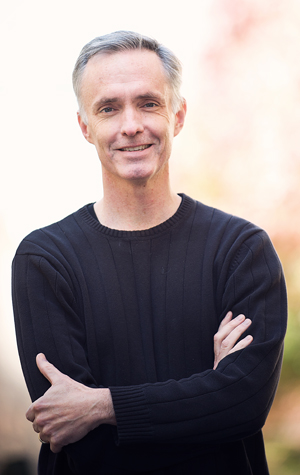World Technology Network: Collins Likely to Change the Future
Another award for ENG biomedical engineering prof

After receiving a MacArthur “genius” award, a Metcalf Cup and Prize (BU’s highest teaching award), a National Institutes of Health award, and numerous other honors, James Collins’ biomedical engineering research has now earned him a global prize, announced at the United Nations on October 26.
Collins, a College of Engineering professor of biomedical engineering, beat out four peers, including two Nobel laureates, for the 2011 World Technology Award for Biotechnology, one of 20 in various categories given this year by the World Technology Network (WTN), a global club with more than 1,000 members—scientists and organizations—spanning 60 countries. The WTN has given its annual awards since 2000; for winning, Collins becomes a member of the organization and receives a “nice glass trophy,” he says.
“I am delighted to have our lab’s work in synthetic biology and antibiotic drug discovery recognized,” Collins says. “It was a great honor to be included with so many highly innovative technologists and technology-focused companies.”
Collins’ work includes developing synthetic gene networks within organisms like bacteria to attack tumors and guide the development of stem cells. He has also helped develop medical devices, from vibrating insoles for steadying elderly people’s balance to a treatment tool for stroke-induced brain failure. He has helped launch start-up companies and has had several inventions licensed by various firms.
Among the past winners of the WTN’s biotech award are human genome sequencer Craig Venter (Hon.’04). Candidates for WTN awards are nominated by previous winners and finalists; this year’s winners, honored for work “of the greatest likely long-term significance,” were chosen with the advice of an advisory group that included the inventor and author Ray Kurzweil.
Collins is one of BU’s elite William Fairfield Warren Distinguished Professors and a Howard Hughes Medical Institute investigator and last year won the Lagrange-CRT Foundation Prize from an Italian foundation for “outstanding contributions relevant to the progress of complexity science.” (That’s the multidisciplinary study of complex systems.)
He has a B.A. from Holy Cross and a doctorate from Oxford.

Comments & Discussion
Boston University moderates comments to facilitate an informed, substantive, civil conversation. Abusive, profane, self-promotional, misleading, incoherent or off-topic comments will be rejected. Moderators are staffed during regular business hours (EST) and can only accept comments written in English. Statistics or facts must include a citation or a link to the citation.